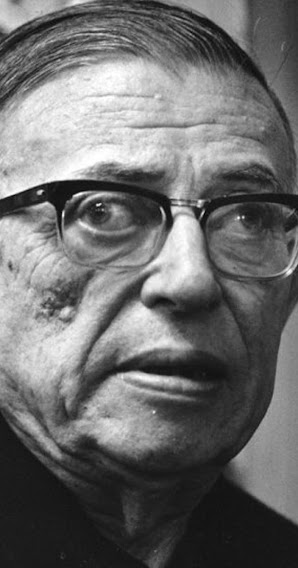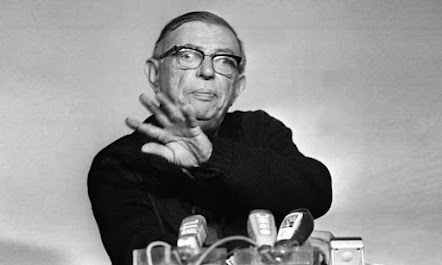Is Radical Subjectivity a Path to Happiness? - "Existentialism is a Humanism" - Jean Paul Sartre
"Existentialism is a Humanism"
 |
| Jean Paul Sartre |
A few problems that I have with Sartre's essay. First, the non-existence of God is assumed, because we have freedom of choices to determine our lives, rather than proven. Also, he claims that we have no essence, yet he argues through the work that the fundamental essence of humanity is freedom and sincerity. It seems hard to buy his theory that any authentic choice will be the right choice for that person because it is there choice. In my opinion, some choices are just inherently bad. We have an essence, actions have an essence, that is not of our own creating. It seems out of touch with reality to suggest otherwise. Likewise, just because there are certain situations where there is some room for interpretation in the traditional moral law (as with the story he tells about the boy drawn between helping his mother and fighting in the war) doesn't mean that there is no moral law. Also, he seems to contradict himself in saying that beginning with the Cartesian Cogito we are the loneliest of people, but then at the same time hold that we can actually transcend our subjectivity. Descartes, Berkeley, and other Rationalists created elaborate systems to solve that problem, Sartre just assumes that its possible with no explanation or rigorous explanation, at least in this work.
Anyway, below is my summary of his work! Let me know what you think of my criticisms.
We Fashion Man in Our Own Image
Sartre begins the essay addressing what he sees as misunderstanding of his philosophy, atheistic existentialism. His starting definition is as follows: "... by existentialism we mean a doctrine which makes human life possible, and in addition, declares that every truth and every action implies a human setting and a human subjectivity." The meaning of this will be expounded in the essay but off the bat he identities two misunderstandings leveled at him. First, he says that the Communists label existentialism a bourgeoise philosophy in that it has no impetus for acting in the world. There is no law of history by which we are impelled to act, only the individual's subjectivity. Therefore, it is labeled as a contemplative philosophy removed from practical action, and thus "bourgeoise." On the other hand, he says that Catholic critics have called existentialists indulging human degradation through its lack of consideration of others beyond the self. He points out that these charges are leveled because existentialists are Cartesian in nature, beginning in human subjectivity and unable to bridge the gap back to the objective world. Also because in this solipsism they reject God's commandments as well, focusing on nothing outside of the individual. "...with everyone permitted to do as he pleases and incapable, from his own point of view, of condemning the points of view and acts of others." 1
Sartre, while recognizing that there are variants of existentialism such as Christian existentialism, claims that what is fundamental to existentialism in a strict philosophical sense is that "... existence precedes essence, or, if you prefer, that subjectivity must be the starting point." What does this mean? Well, he says that "essence" or the design of a thing exists before the embodied existence of the thing when it comes to intelligently designed things. If someone produces a stapler they have to have the idea and the means of production before it can actually be made. Likewise, if human beings have a nature it is because it existed previously in the mind of God. 2
But, Sartre says, what is there is no God? Sartre says that if there's no God to define human nature, then humans are the one thing where existence precedes essence. Human beings begin as "nothing" and show up on the scene, only to then realize that they can define themselves and create themselves to be whatever they want. "Man is nothing else but what he makes of himself." Thus, man has the ability to use his will to forge himself into the future as he sees fit. Thus, if there is a "responsibility" bound up with existentialism, it is that man has a responsibility to determine his own future and the universal future he wants to live in. This responsibility has as a further connotation, though, for Sartre. To determine ourselves to be this type of being, to forge the essence of man as we want, is also to claim that this is the right view of humanity for everyone else. Thus, our individual choices involve a vision for all human beings. 3 "Therefore, I am responsible for myself and for everyone else. I am creating a certain image of man of my own choosing. In choosing myself, I choose man."
"Anguish, Forlorn, and Despair"
Sartre introduces the existential concept of "anguish" as the feeling of anxious responsibility that he has in his actions because he knows that he not only chooses for himself, but his actions are like a law for all mankind, that it should act in that way too. He has no divine command about how to act, and Sartre mocks those who claim to have such a divine guidance, and so the entire responsibility of man's essence is placed on the individual man. 4 There are no right or wrong choices, though, only authenticity of inauthenticity. If someone puts thought into his actions as representing all of mankind, then the choice has value. If the opposite, only then can the choice said to be bad. "All leaders know this anguish. That doesn't keep them from acting; on the contrary, it is the very condition of their action. For it implies that they envisage a number of possibilities, and when they choose one, they realize that it has value only because it is chosen."
Sartre then introduces the concept of "forlorn." He says that previously there was a trend in France to try to do away with God, yet keep all the same value systems as somehow a priori to us. He rejects this idea, though, holding that if God doesn't exist then there can be no value system, no human nature, no objective morals. Man is therefore freedom itself, but with nothing to guide himself except himself. "If existence really does precede essence, there is no explaining things away by reference to a fixed and given human nature. In other words, there is not determinism, man is free, man is freedom. On the other hand, if God does not exist, we find no values or commands to turn to which legitimize our conduct. So, in the bright realm of values, we have no excuse behind us, nor justification before us. We are alone with no excuses."
Here, then, Sartre emphasizes the extent of human freedom. We are not free in the sense that we are "thrown" into existence without our choice. But we are completely free after that point to make of ourselves what we will. Passion or desire is no excuse, for freedom overcomes even them as well. "Man ... is condemned in every moment to invent man." 5 But man is forlorn, or sad, because there seems to be no trustworthy guide for his actions, only himself. He recounts the story of a young man who has a disaffected father, an older brother killed in a war, and a mother who was dependent on him. The young man was torn between joining the war to fight or staying at home and taking care of his mother. Sartre argues that no Christian doctrine, nor Kantian principle, can help explain what he should do. They are too vague and unclear as to the particulars. And to follow emotion is to fall into a vicious circle of justification. I have an emotion which justifies my action, but its only through the action that I truly confirm that emotion, so which is first? 6 To even consult someone in particular for advice is to be biased towards them, to just reflect a desire already of yourself. To look for a religious sign is to simply be biased towards that "omen" and how you will personally interpret it. To look for a priest is to be biased to find the type of priest who will tell you what you want to hear. "Therefore, in coming to see me he knew the answer I was going to give him, and I had only one answer to give: 'You're free, choose, that is, invent.'" The unavoidable interpretation of our life and its meaning is put on us, and us alone, Sartre thinks. Therefore, we are forlorn.
Finally, "despair" is introduced as the problem that, though I am freedom, I cannot will everything that I want. I am limited by reality in the possibilities of what I can have happen. 7 Thus, unless one can clearly see the positive outcome, one cannot put their trust in it. This doesn't mean man should give up, but rather that he must try with all his might to accomplish the future that he wants, but not to have illusions as to its actual outcome. "The doctrine I am presenting is the very opposite of quietism, since it declares, 'There is no reality except in action.' Moreover, it goes further, since it adds, 'Man is nothing else than his plan; he exists only to the extent that he fulfills himself; he is therefore nothing else than the ensemble of his acts, nothing else than his life.'"
Man is Only His Actions
Sartre makes clear that, for the existentialist, you are only what you are able to actualize in your life, the relationships that make up the different pursuits that you actually do. You aren't your dreams, desires, hopes, or anything of the sort. 8 Sartre rejects the idea of biological determinism, there is no getting off the hook. If you are a coward it's because of your free choices to be so. If you're brave, then likewise. We have the temptation to blame everything on inherent traits and circumstances, but this is totally backwards. "What the existentialist says is that the coward makes himself cowardly, that the hero makes himself heroic." Existentialism, then, is a philosophy of action and optimism in these senses.
This set of actions that makes man up is based in the fundamental truth of his subjectivity. Sartre clearly defines himself as a Cartesian, starting from the truth of Descartes' "cogito." 9 He views no other truth as sure other than that, and therefore this subjectivity as the foundation for all other truths. He rejects the Materialist view, that we are just like any other animal or object. Rather, we are subjectivity and in the cogito we discover that others are like us. It is these others that confirms our own being. For I cannot be called by any quality except in relation to those calling me it. For example, lazy is a quality dependent on the others judging what that constitutes. "Hence, let us at once announce the discovery of a world which we shall call intersubjectivity; this is the world in which man decides what he is and what others are."
If there is a human nature it is something more like the general human condition, i.e. that we all begin life with a certain set of circumstances. Likewise, how we transcend those circumstances and live out our life is up to each of us. Therefore, every life is comprehensible to the existentialist because it's all one and the same situation. 10 Therefore, one's actions are no only for themselves as an individual, but form an absolute humanity by them as well, though this can change if man's actions change.
Authenticity Versus Inauthenticity
Sartre then takes time to respond to some objections that this is something like pure relativism or subjectivity, so it doesn't matter what one chooses anyway. Sartre responds by saying that it is impossible to not choose something. Even not acting is a choice, and therefore all actions are choices. Whichever the individual makes is what he sees fit according to his circumstances and which determines the rest of humanity for him. There are no rules he has to follow save that of serving himself. Like a work of art which is actualized in each situation, unique to the individual without strict or "apriori" values. 11 "Man makes himself. He isn't ready made at the start. In choosing his ethics, he makes himself, and force of circumstances is such that he cannot abstain from choosing one. We define man only in relationship to involvement."
[As a side note here, Sartre uses the term "configuration" to mean the situation of the individual and their active choosing to make it what they want it to be.]
Sartre then responds to the claim that the existentialist can pass no judgment on the actions of others. He partially agrees, but disagrees in the sense that he thinks if someone consciously ["sanely and sincerely"] chooses for themselves in a situation, that this is the only decision they could have made, as this is the one he chose. "It is true in this sense, that we do not believe in progress. Progress is betterment. Man is always the same. The situation confronting him varies. Choice always remains a choice in a situation." Now he claims that from a logical perspective we can make a judgment that someone acted from faulty information, but we cannot make a value judgment on them. Here Sartre then makes the connection that to choose in a way that's not sincere is an error of judgment. He passes no value judgment on them, only that they have based their choice on a lack of information, a lack of sincerity. And yet, at the same time, if someone truly wanted to be dishonest, Sartre would say that they are actually being honest to themselves and who they are. Thus, if there was to be any value at all, it would only be freedom to choose for oneself in each situation, or maybe being "sincere" to oneself in each situation. 12 Thus, when the existentialist comes to understand that there is no essence, that all he really desires is freedom, and that his choice is the choice for all humanity, then he desires the same for all, the freedom of choice.
Sartre then claims that anyone who doesn't recognize this fundamental freedom, but tries to live based on value ethics or material determinism is the only coward. He then recounts a story of a passionate woman who fulfills her "true love" by committing adultery with this particular man, while another in a similar situation does not go through with it. "One may choose anything if it is on the grounds of free involvement." In other words, as long as it is a totally free choice, cut off from any type of essential or objective values outside of one's own choosing, then its a good choice. 13
So Is Existentialism a Humanism?
Sartre concludes the essay addressing one last objection, that the existentialist has no values, all is interchangeable. Sartre admits to this, but it must be that way because there is no God to tell us otherwise. We must invent a meaning for a life that has no meaning. "My answer to this is that I'm quite vexed that that's the way it is; but if I've discarded God the Father, there has to be someone to invent values." Sartre claims that existentialism can be a humanism, though. It is not the humanism of holds man as his own end and has a view of human exceptionalism. Nor a view that man is to serve a collective mankind in a type of fascism. Rather, he claims that existentialism is a humanism because man is fundamentally turned in on himself in his subjectivity and atheistic loneliness, yet life is to try to transcend that subjectivity to live in the world with others. "... is what we call existential humanism. Humanism because we remind man that there is no law-maker other than himself, and that in his forlornness he will decide by himself; because we point out that man will fulfill himself as man, not in turning toward himself, but in seeking outside of himself a goal which is just this liberation, just this particular fulfillment." Sartre concludes saying that existentialism isn't focused on God's not existing, actually even if God did exist they wouldn't really care. They are focused on the optimism of making one's life into what one desires.
---------------------
1 - Baird, Forrest E. and Walter Kaufmann. Twentieth Century Philosophy: Third Edition. Jean Paul Sartre. Existentialism is a Humanism. Prentice Hall (New Jersey, 2003). Pg. 225.
2 - 226
3 - 227
4 - 228
5 - 229
6 - 230
7 - 231
8 - 232
9 - 233
10 - 234
11 - 235
12 - 236
13 - 237







Comments
Post a Comment